Check UPSC Mains Result 2023 Here. Analyze cutoff marks, subject-wise performance, and choose your optional wisely for a successful journey in the civil services exam.
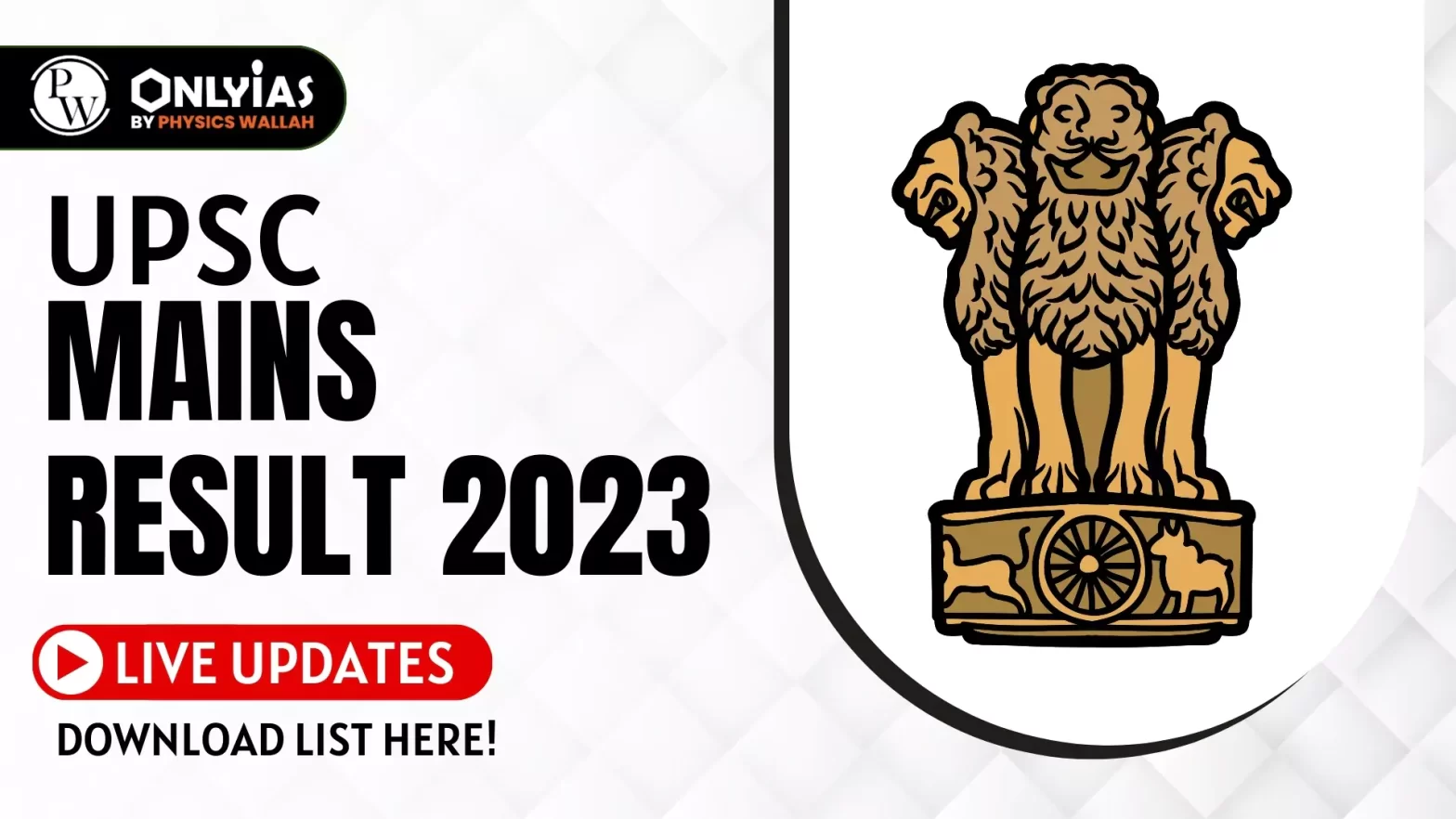
Every year, the Union Public Service Commission conducts the Civil Services Exam for All India Services and various other Group A services of the Indian Government. These services predominantly entail administrative roles. Aspiring candidates aiming to enter these services must successfully navigate a year-long examination, consisting of the Preliminary exam, Mains exam, and Personality Test.
A total of 2916 candidates are declared successful in UPSC MAINS 2023 examination and will be called for Interview by UPSC. While 28 candidates result is currently withhold by UPSC due to pending court case.
| Download UPSC Mains Result 2023 (Roll No.), Click Here
Download UPSC Mains Result 2023 (Namewise), Click Here |
 Detailed Application Form (DAF)
Detailed Application Form (DAF)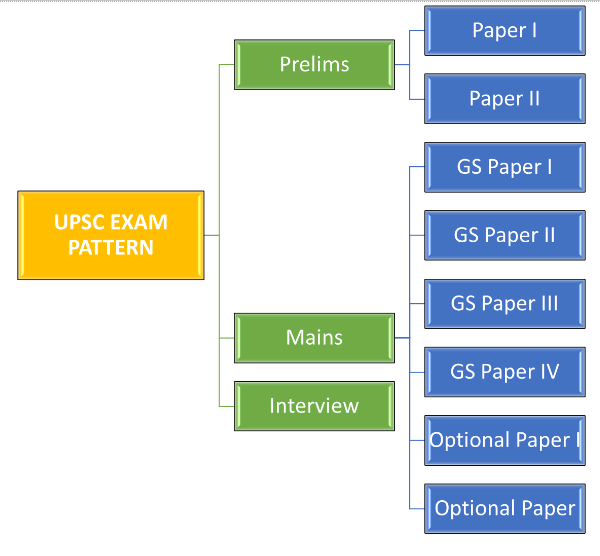
|
Marks Distribution for UPSC Mains Result 2023 Qualifying Papers (Indian Language and English):
Merit-Based Papers: The seven merit-based papers are generally distributed as follows:
The Optional Subject (Paper VI and VII) contributes an additional 500 marks, making the total marks for the entire Mains examination 2025. Marks obtained in these merit-based papers are crucial for determining a candidate’s rank and eligibility for the interview stage. |
|---|
| Year | Appeared For Prelims | Qualified For Mains | Appeared for Mains | Qualified For Interview | Success Rate for Mains (%) |
| 2007 | 161469 | 9158 | 8886 | 1883 | 20.56 |
| 2008 | 167035 | 11669 | 11330 | 2136 | 18.30 |
| 2009 | 193091 | 11894 | 11516 | 2431 | 20.43 |
| 2010 | 269036 | 12271 | 11865 | 2589 | 21.09 |
| 2011 | 243236 | 11837 | 11237 | 2415 | 20.40 |
| 2012 | 271442 | 12795 | 12190 | 2674 | 20.89 |
| 2013 | 324279 | 14800 | 14178 | 3001 | 20.27 |
| 2014 | 446623 | 16706 | 16286 | 3308 | 19.80 |
| 2015 | 465882 | 15008 | 15008 | 2797 | 18.60 |
| 2016 | 459659 | 15452 | 15445 | 2961 | 19.10 |
| 2017 | 462848 | 13300 | 13060 | 2564 | 19.27 |
| 2018 | 500484 | 10419 | 10246 | 1992 | 19.11 |
| 2019 | 493972 | 11845 | 11700 | 2043 | 17.24 |
| 2020 | 482770 | 10564 | 10484 | 2053 | 19.40 |
| 2021 | 508619 | 10423 | 10100 | 1951 | 18.71 |
| 2022 | 573735 | 13090 | 12998 | 2529 | 19.30 |
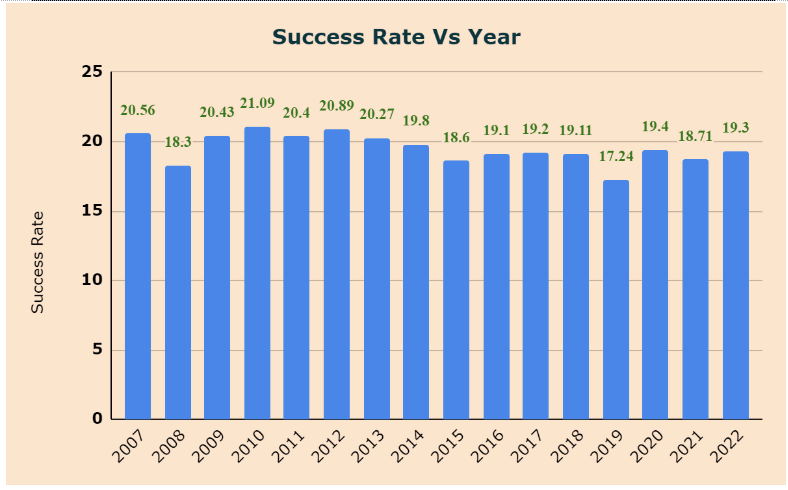
The official data, released by the Department of Personnel Training, displays the count of candidates participating in the civil services examination. The most recent available data pertains to the year 2019. The table below presents the figures for candidates opting for different optional subjects from the year
| Optional Subject | 2015 | 2016 | 2017 | 2018 | 2019 |
| Geography | 4351 | 4049 | 2669 | 1993 | 1916 |
| History | 2090 | 3870 | 1074 | 842 | 751 |
| Sociology | 2490 | 1555 | 1421 | 1072 | 1263 |
| Pub Ad. | 7077 | 3301 | 1165 | 726 | 705 |
| Psychology | 1163 | 1061 | 193 | 128 | 164 |
| Political Science and IR | 1107 | 1320 | 1246 | 1317 | 1662 |
| Philosophy | 1116 | 2092 | 755 | 463 | 439 |
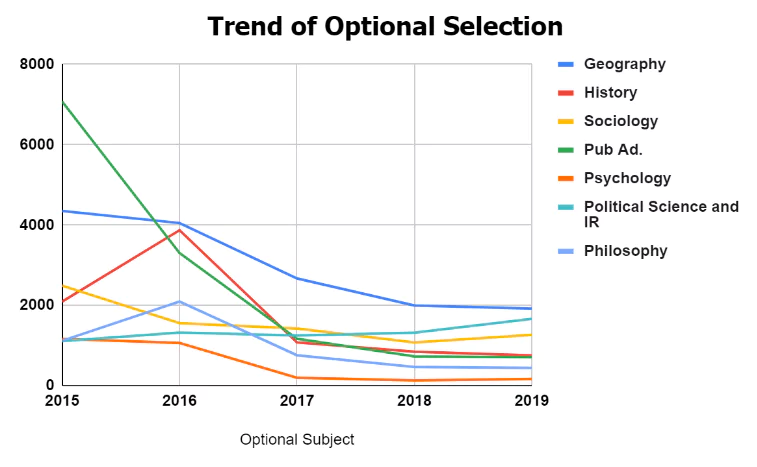
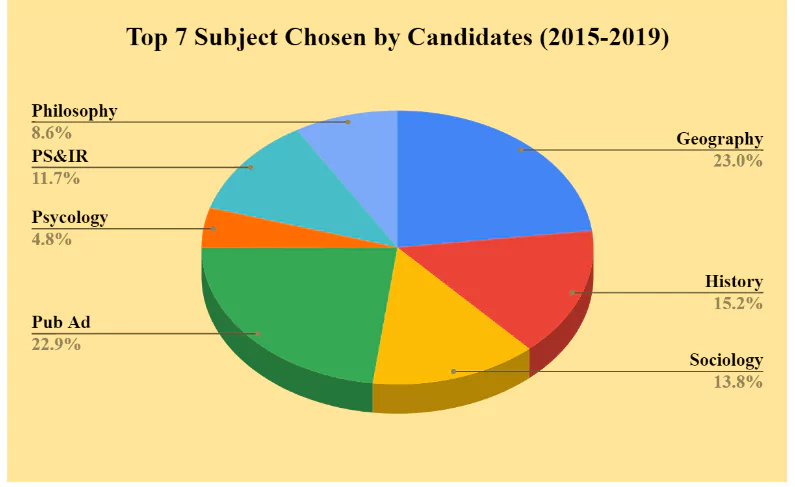
Based on the analysis carried out on the optional subjects having high success rates in UPSC Mains 2020. The Best Optional Subject for the UPSC IAS Mains Exam has been given below.
| Optional Subject | Candidate Appeared | Candidate Cleared | Success Rate (%) |
| Geography | 4229 | 702 | 16.59 |
| Public Administartion | 4144 | 633 | 15.28 |
| Sociology | 2630 | 430 | 16.35 |
| History | 2270 | 349 | 15.36 |
| Political Science and IR | 1840 | 341 | 18.54 |
| Economics | 1454 | 247 | 16.98 |
| Anthrolpology | 1249 | 229 | 18.33 |
| Philosophy | 751 | 162 | 21.57 |
| Psychology | 652 | 110 | 16.87 |
| Mathematics | 277 | 47 | 16.97 |
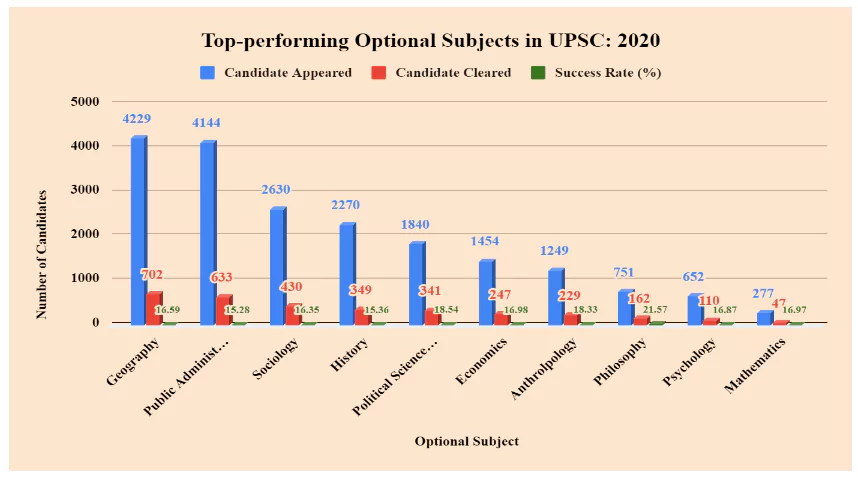
| Optional Subjects | Candidates appeared | Candidates Recommended | Success Rate (%) |
| Animal Husbandry and Veterinary Science | 16 | 3 | 18.80 |
| Management | 54 | 6 | 11.10 |
| Commerce and Accountancy | 183 | 20 | 10.90 |
| Economics | 243 | 26 | 10.70 |
| Agriculture | 124 | 13 | 10.50 |
| Medical Science | 247 | 26 | 10.50 |
| Civil Engineering | 146 | 15 | 10.20 |
| Law | 186 | 19 | 10.30 |
| Sociology | 1263 | 126 | 10.00 |
| Anthropology | 1189 | 108 | 9.1 |
| Zoology | 44 | 4 | 9.1 |
| Psychology | 164 | 15 | 9.1 |
| Chemistry | 156 | 13 | 8.3 |
| Mathematics | 539 | 45 | 8.3 |
| Public Administration | 705 | 58 | 8.2 |
| Political Science and International Relation | 1662 | 137 | 8.2 |
| Electrical Engineering | 200 | 16 | 8 |
| Physics | 165 | 12 | 7.3 |
| Botany | 28 | 2 | 7.1 |
| History | 751 | 51 | 6.8 |
| Philosophy | 439 | 27 | 6.2 |
| Mechanical Engineering | 213 | 12 | 5.6 |
| Geography | 1916 | 105 | 5.5 |
| Geology | 30 | 0 | 0 |
| Statistics | 2 | 0 | 0 |
| Assamese Literature | 3 | 0 | 0 |
| Bengali Literature | 1 | 0 | 0 |
| English Literature | 31 | 3 | 9.7 |
| Gujarati Literature | 85 | 3 | 3.5 |
| Hindi Literature | 191 | 13 | 16 |
| Kannada Literature | 124 | 17 | 13.7 |
| Maithili Literature | 53 | 2 | 3.8 |
| Malayalam Literature | 105 | 13 | 12.4 |
| Manipuri Literature | 7 | 0 | 0 |
| Marathi Literature | 6 | 0 | 0 |
| Odiya Literature | 3 | 0 | 0 |
| Punjabi Literature | 18 | 1 | 5.6 |
| Sanskrit Literature | 53 | 2 | 3.8 |
| Sindhi Literature | 2 | 1 | 50 |
| Tamil Literature | 77 | 5 | 6.5 |
| Telugu Literature | 32 | 1 | 3.1 |
| Urdu Literature | 18 | 2 | 11.1 |
| Optional Subjects | Candidates Appeared | Candidates Recommended | Success Rate |
| Management | 86 | 7 | 8.1 |
| Civil Engineering | 124 | 11 | 8.9 |
| Bengali Lit. | 3 | 0 | 0 |
| Mechanical Engineering | 170 | 19 | 11.2 |
| Urdu Lit. | 26 | 5 | 19.2 |
| Bodo Lit. | 1 | 1 | 100 |
| Commerce and Accountancy | 224 | 28 | 12.5 |
| Zoology | 55 | 1 | 1.8 |
| Kannada Lit. | 115 | 4 | 3.5 |
| Animal Husbandry and Veterinary Sciences | 23 | 2 | 8.7 |
| Public Administration | 1165 | 119 | 10.2 |
| Botany | 44 | 5 | 11.4 |
| Mathematics | 441 | 26 | 5.9 |
| International Relations and Political Science | 1246 | 117 | 9.4 |
| Tamil Lit. | 107 | 5 | 4.7 |
| Manipuri Lit. | 13 | 1 | 7.7 |
| Telugu Lit. | 72 | 1 | 1.4 |
| Geography | 2669 | 147 | 5.5 |
| Sindhi Lit. | 2 | 1 | 50 |
| English Lit. | 21 | 2 | 9.5 |
| Philosophy | 755 | 53 | 7 |
| Statistics | 3 | 0 | 0 |
| Marathi Lit. | 17 | 0 | 0 |
| Chemistry | 126 | 11 | 8.7 |
| Gujarati Lit. | 101 | 8 | 7.9 |
| Hindi Lit. | 267 | 19 | 7.1 |
| Agriculture | 89 | 11 | 12.4 |
| Oriya Lit. | 5 | 0 | 0 |
| Malayalam Lit. | 111 | 8 | 7.2 |
| Psychology | 193 | 21 | 10.9 |
| Nepali Lit. | 1 | 0 | 0 |
| Sociology | 1421 | 137 | 9.6 |
| Assamese Lit. | 3 | 0 | 0 |
| Anthropology | 880 | 85 | 9.7 |
| Physics | 140 | 14 | 10 |
| Law | 304 | 43 | 14.1 |
| Maithili Lit. | 78 | 5 | 6.4 |
| Punjabi Lit. | 39 | 6 | 15.4 |
| History | 1074 | 59 | 5.5 |
| Medical Sciences | 313 | 32 | 10.2 |
| Electrical Engineering | 193 | 19 | 9.8 |
| Economics | 233 | 16 | 6.9 |
| Geology | 37 | 2 | 5.4 |
| Sanskrit Lit. | 70 | 5 | 7.1 |
| Must Read | |
| NCERT Notes For UPSC | UPSC Daily Current Affairs |
| UPSC Blogs | UPSC Daily Editorials |
| Daily Current Affairs Quiz | Daily Main Answer Writing |
| UPSC Mains Previous Year Papers | UPSC Test Series 2024 |
The UPSC Mains Result 2023 can be checked on the official UPSC website.
The cutoff marks from UPSC Mains Result 2023 serve as decisive factors in determining eligibility for further stages.
There are 48 Optional Subjects in UPSC that a candidate can choose from. These 48 UPSC Optional Subjects List includes the technical & literature subjects.
Choosing the best optional subject for UPSC mains is subjective and depends on your interests, background, and comfort with a particular subject.
It is not mandatory, but it provides a slight understanding of the UPSC Mains syllabus. Several candidates with an engineering background have scored well and successfully cleared subjects in the Arts category.
No, it's not advisable to choose an optional subject solely because many candidates are opting for it. Relying on the choices of high achievers might lead to difficulties. Instead, select an optional subject based on your personal interests, comprehension, and expertise.
Yes, opting for an optional subject in UPSC that overlaps with the General Studies paper is a prudent choice as it can save time. Choosing a subject that you've already studied in your master's or undergraduate program is even wiser, as you'll be familiar with the fundamental concepts of the subject.
Consider your interests, existing knowledge, syllabus scope, preparation time, availability of study materials and alignment with General Studies.
Both technical and non-technical subjects have potential for high scores. Technical subjects have objectivity, while non-technical subjects with GS overlap provide more preparation time and materials.

<div class="new-fform">
</div>